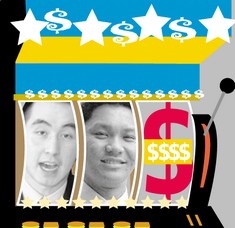 From my studies and personal observations, I believe that the Asian continent has produced the world’s best gamblers. Persons of Asian heritage attack the games of the casinos all over the world with a vigor and zest not found coming from other ethnic groups. The explanations for Asians’ love of gambling are explored in Appendix A in the section “The Best Gamblers in the World.” Here we consider the irony that the most prevalent religions of the Asian continent—Muslim, Hindu, Buddhist, and Shinto—all frown upon gambling activity. The religious activities have greatly limited the scope of legal gambling that is permitted, although there are exceptions to the rule. Many countries permit lotteries and horse racing. The major jurisdictions—indeed the two most populous countries in the world, China and India—totally ban gambling, however. (The enclave known as Macao is now part of China, and its casino gambling will be reviewed over the next few years by authorities in an effort to decide whether it will stay or go. See Macao.) India has allowed gambling boats, and there are also horse racing tracks and lotteries, but there is no casino gambling.
From my studies and personal observations, I believe that the Asian continent has produced the world’s best gamblers. Persons of Asian heritage attack the games of the casinos all over the world with a vigor and zest not found coming from other ethnic groups. The explanations for Asians’ love of gambling are explored in Appendix A in the section “The Best Gamblers in the World.” Here we consider the irony that the most prevalent religions of the Asian continent—Muslim, Hindu, Buddhist, and Shinto—all frown upon gambling activity. The religious activities have greatly limited the scope of legal gambling that is permitted, although there are exceptions to the rule. Many countries permit lotteries and horse racing. The major jurisdictions—indeed the two most populous countries in the world, China and India—totally ban gambling, however. (The enclave known as Macao is now part of China, and its casino gambling will be reviewed over the next few years by authorities in an effort to decide whether it will stay or go. See Macao.) India has allowed gambling boats, and there are also horse racing tracks and lotteries, but there is no casino gambling.
In the area known as Asia Minor (and the Middle East), Turkey has had casinos since 1969. The legality of the facilities has been under constant scrutiny, however, and the gambling has not been able to be focused toward any societal goals such as economic development. For many decades before the 1970s, Lebanon offered the finest casino in the Middle East. Internal warfare totally destroyed the entertainment value of gambling in the country. When the Palestine state gained a measure of sovereignty in the 1990s, it authorized a casino that sought much of its patronage from Israeli citizens.
Nepal has small casinos for foreign visitors to the hotels in Kathmandu. Most of their patrons are Indians. The only other casinos on the soil of mainland Asia are in Korea. Casinos have operated there since 1967 as a way to attract foreign capital. Local residents are not permitted into the casinos. Among the foreign patronage are the 40,000 U.S. military personnel stationed in the country.
A government organization in the Philippines runs twelve casinos. Additionally, the organization has contracts with foreign investors who operate private casinos in several large hotels. The Philippines have not been subjected to the religious restraints of most of the Asian countries, as the islands were under Spanish and U.S. control with strong, gambling-tolerant Catholic influences for nearly four centuries before independence came in 1946.
Malaysia offers an interesting casino environment. The Genting Highlands resort, located thirty-five miles from the capital city of Kuala Lumpur, is the only permitted casino. It has been in operation since 1970, with a complex of 3,500 hotel rooms and 200,000 square feet of casino space. Until the Las Vegas MGM and Foxwoods in Connecticut opened casinos in the 1990s, Genting Highlands was the largest casino in the world. (Indeed, when the Pequot tribe of Native Americans wished to build Foxwoods, it was refused financing by every U.S. source because it was too big a risk. The tribe eventually received its loan from the Genting Highlands Gaming Corporation.) As the Muslim faction among the Malaysian population has considerable political influence, it has permitted the casino only under the condition that only non-Muslim Malaysian residents may enter the casino. The Muslim religious organization is allowed to patrol the casino with a police arm. It has the authority to drag out any local Muslims it finds, and the religious authorities mete out punishment.
Japan offers many gambling experiences; however, casinos as such are not permitted. The Japanese government lottery is the largest single lottery in the world in terms of revenues. There is also horse racing. Unique forms of gambling include pari-mutuel wagering on bicycle and motorboat racing. Although there are no gambling halls with casino table games, there are 18,000 gambling halls featuring machines. Most of the machines are pachinko machines (see Japan and Pachinko).
|
|